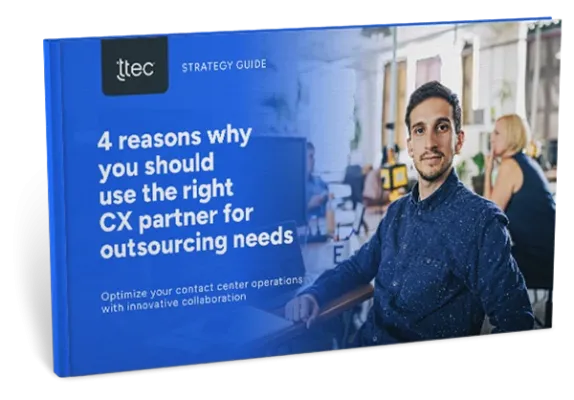As retailers contend with the latest slate of challenges—inflation, snarled supply chains, the return to experience spending—there’s no overstating the importance of having a high-quality contact centre. Contact centres are often where customers directly interact with a brand, and their experiences can bring swift consequences: positive experiences can lead to sales and repeat business, while negative ones can turn customers off a brand for good.
Deciding whether to manage a captive contact centre or partner with a customer experience outsourcer is critical to delivering a customer experience that is aligned with a retailer’s rate of growth and meets customer expectations.
In this blog post we'll look at the pros and cons of a captive model versus outsourcing models and explore five ways that outsourcing contact centres can provide your company an ideal approach to improve CX, empower employees, accelerate digital transformation, and improve contact centre operational KPIs.
What is the difference between a captive contact centre and outsourcing?
Captive centres are those that are client owned and operated and provide resources directly to their organisation. The associates working in captive centres are employed by the company, not a vendor. Outsourcing, on the other hand, is a process in which an organisation recruits another company to carry out tasks, handle operations, or provide service delivery.
When choosing between managing a captive contact centre or entrusting tasks to a CX partner, a few things to consider include:
1. Hiring the right people
A survey by PwC found that 73% of consumers said that a good experience is key in influencing their brand loyalties and 52% would pay more for a speedy and efficient customer experience. These findings call attention to the fact that more is expected of service and sales associates than ever before. Today’s retail workforce must possess complex problem-solving skills, excel in people management, coordinate well with others, adapt to changing consumer demographics, and have high emotional intelligence. In an era when so many simple tasks are being handled by AI, the complex problems are left to the people – so finding the right ones is key.
Finding contact centre employees with the right skillset can be difficult for brands to do efficiently. At the same time, it is important to ensure all associates remain on-brand and embrace the corporate culture. An outsource partner, which has experience and expertise in this area, can take the burden off the brand so that it can focus on its core competencies and business mission.
With the right associates, everybody wins: employees feel empowered to make decisions that benefit both customers and the company, customers have positive experiences, and companies’ bottom lines will benefit as a result.
2. Becoming more efficient
Business takes place in the global marketplace 24/7 these days, and customers expect to be able to access brands whenever it’s convenient for them. This means retailers must be ready to offer support at any time, on any channel, in any language. Associates who don’t meet these expectations risk a frustrating and disconnected experience.
While this can be challenging for a captive centre, a benefit of process outsourcing is that an outsource partner has resources around the world – with physical space, technology, and staff at the ready for short term or long term. During periods of high volume, such as the holiday season, partner experts and delivery centres know how to act quickly and move to the next objective. Tasks get completed faster and more efficiently, which can improve KPIs and provide cost reductions.
3. Faster and more effective training
When supporting customers, speed and efficiency are the names of the game. An outsourcer can help you get there by training more contact centre associates faster and more effectively and business processes and customer support. Well-versed in industry best practices, outsourcers are equipped to use the latest technology to boost productivity and bottom lines – like TTEC’s RealPlay Bot, which lets associates practice with and get real-time feedback from a bot that acts like an AI-powered customer.
An outsourcer can work to make sure retail employees are motivated and equipped with the right skills to deliver great customer service experiences during each interaction. In giving the right tools and training, they help retailers build a workforce that is competent, collaborative, and connected.
4. Tapping into expertise
Too often, customer service serves a secondary function because brands are so focused on their products and services. This doesn’t bode well for those brands since, more and more, customers are looking to customer experience as a differentiator, even ahead of products and price in some cases.
The right outsource partner, on the other hand, lives and breathes customer experience. They specialize in end-to-end CX capabilities, can leverage digital and next-gen strategies, provide operations rigor, have global depth of best practices, and hire and retain world-class associates who serve as brand ambassadors. The expertise a brand may lack in-house can be found in the right partner.
5. Optimising digital
Not surprisingly, digital plays a growing role in retail. Another difference between captive centres versus outsourced ones is that outsourcing partners can give brands the digital edge. Customers want more digital and technology options, meaning brands must provide multiple channels of support. Not only that, but they also need to understand which channels work best for various types of interactions. An outsourcing partner has the resources and expertise to manage multiple digital channels, freeing the retailer to focus on other areas of the business.
Choose wisely
A captive centre may make sense for retail organisations with low customer support volume and simple customer requests. For organisations that understand their core competency is something other than delivering great customer experience but seek to differentiate themselves with world-class customer experience, working with a CX partner is key. The right partner will bring expertise and tech know-how in digital channels, and balance people with technology in a cost-effective manner – all in a way that allows retailers to concentrate on their core business mission.
















